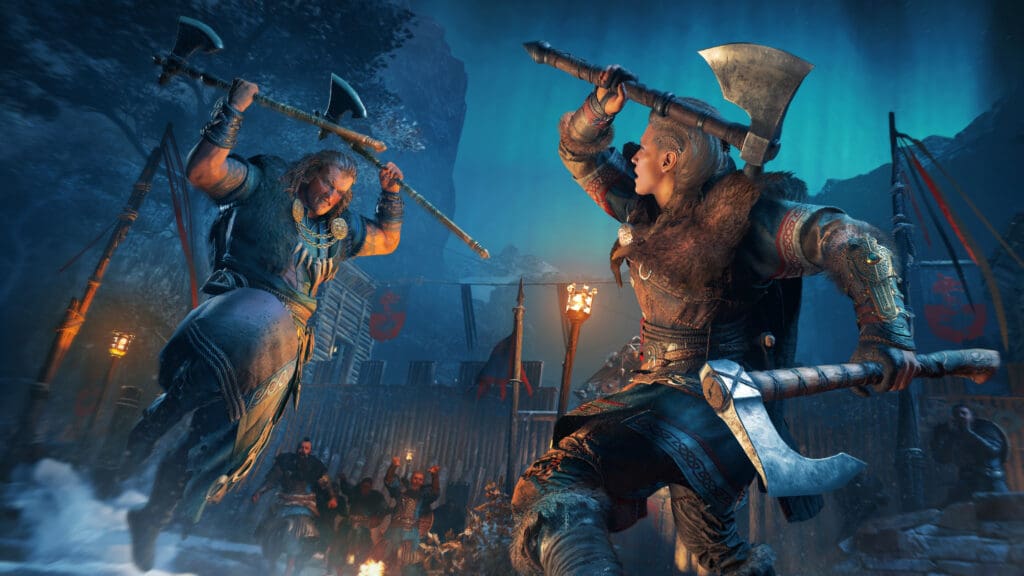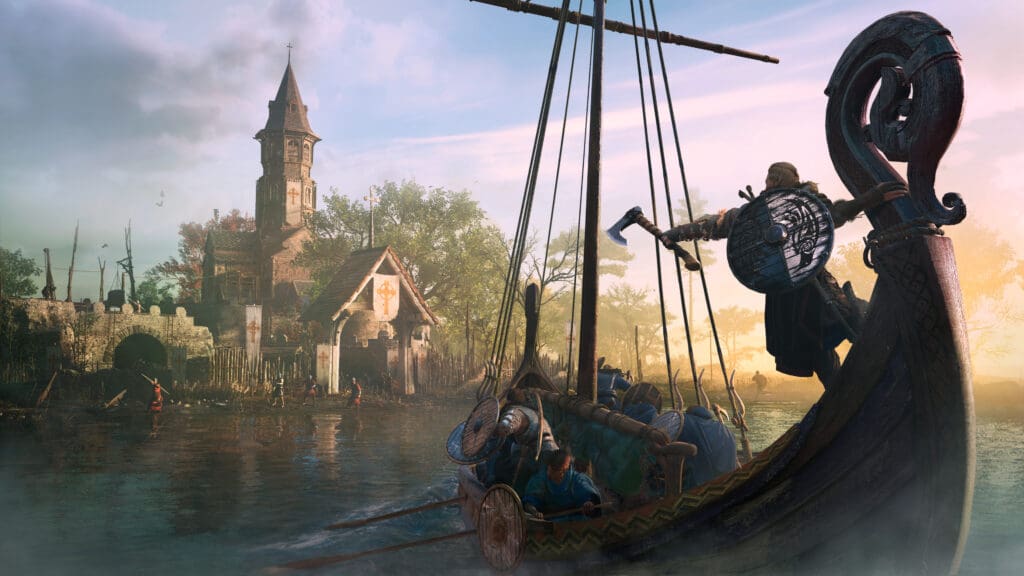There are few things that get me as excited as seeing some of my favorite elements come together for a game. Enjoying the success of 2018’s God of War, and popular TV and Movies such as Vikings, Norsemen, and Thor: Ragnarok, it was inevitable that the Assassin’s Creed franchise would try their hand at understanding the monstrous brutes of the North. Adding in music in collaboration with the band Wardruna’s front-man Einar Selvik, and my hype-boner simply couldn’t be contained. I’ve been chomping at the bit for months to get my hands on this game, and now that the time has finally arrived, let’s discuss the secrets Valhalla holds.
As you begin your adventure in Norway, you play as a young Eivor, an androgynous young child who sees the tragic events that unfold ultimately ending with the death of their Father. This intro sets the tone for what promises to be a brutal adventure, and keeping in line with Ubisoft’s imitative to be welcoming to all gender identities, the child is depicted in a way that it leaves their identity up to the player. I ultimately thought Eivor as a child felt more masculine (in spite of Eivor being a traditionally female name) but when it came time to choose a gender, I chose to let the Animus decide and as a result I spent the entirety of my time as the female Eivor. Does letting the Animus choose necessarily mean anything? From talking to a few other friends during the review process, they told me they also chose to let the Animus decide and it seemed to be completely random. While I appreciate Ubisoft’s attempts at being welcoming to all identities, I think a lot of these stories would be better told if they would simply choose a character and build around that – but that’s a topic for another time, so enough about that, let’s get back to the adventure.

Once you choose your Eivor, you’re fast-forwarded to Eivor as an adult. Eivor lives with their adopted parents and brother Sigurd. Naturally, the first thing Eivor does is get revenge for the death of their family by attacking the Viking clan who killed their father, reclaiming his axe for themselves. Eivor is then off to sea with Sigurd to England, where the clan plans to gather riches and grow their lands. The battles against the Saxons aren’t exactly historically accurate, but then again, when does that ever really make for a very good game? Eivor eventually meets up with some shadowy friends of Sigurd’s who introduce Eivor to the agenda and the creed of the Hidden Ones (the Assassins), gift Eivor with a hidden blade, and you’re taught about the struggle with the Order of the Ancients (the Templars). This system is a lot like the Nemesis system in Middle Earth: Shadow of Mordor. You gather info about the targets to uncover their identity, and once you know who they are, you can take them out in order to learn more about who leads the Order.
As you progress throughout the game, you’ll need to make new allies in order to drive the Saxons back, but also to uncover the truth about the Order of the Ancients. The writing here is particularly interesting, as you’ll go through quest lines where you’ll need to earn the trust of people in order to make friends. The choices you make depend on the evidence you collect, and your choices are permanent and reflect as the story progresses. This adds some incentive to replay the story once you’ve seen it through to the conclusion. Another thing I particularly enjoyed was the uncertainty of knowing if you ever made the “right” choice or not, since the game never gives any hints — adding even more gravity to the decisions you make.

Once arriving in England, you’ll establish your settlement of Ravensthorpe and you’ll continually raid monasteries and other areas for supplies to build up your town. Early on, you build things like barracks so you can create a Jomsviking, which is an NPC you customize who can be recruited by other players to help assist them on raids, and a blacksmith so you can upgrade your weapons. As your settlement evolves, you’ll be able to open a fishing lodge, a hunting lodge, a tattoo shop, and other things that will give you more things to do in order to earn skill points to further Eivor’s power level.
The game is absolutely beautiful, and while I originally started out on the PS4, the PS5 launched and I was able to pick back up on the new console thanks to Ubisoft Connect allowing me a free upgrade as well as seamlessly transferring my save as if nothing ever happened. The weather effects are astounding, as with HDR you’ll notice the light get dimmer and darker as clouds cover the sun. Looking up into the sky shows an incredibly realistic looking sun and clouds, and a breath-taking Northern Lights effect at night in the Norway section. It’s truly a sight to behold, and I’m incredibly anxious to see how environmental technology advances throughout the new console generation.

Combat is solid, though I will admit that the more I play, the more I miss the almost rhythmic combat of Assassin’s Creed Brotherhood. The combat feels a lot more like it’s in place for The Witcher than it does for Assassin’s Creed – especially with a game about Vikings being so combat heavy, that even when you do choose to assassinate enemies, it feels like you should have the ability to do so regardless of rather or not people around you are alerted. The advanced assassination skill mini-game helps a little bit to put it back in line, but it still feels jarringly out of place.
In fact, that’s my biggest argument with this game as a whole: It’s great, but it doesn’t feel like Assassin’s Creed. So many things feel out of place, including the sections in Valhalla proper where you’re talking with the Gods as if they’re on par with the normal mortals Eivor encounters throughout the world. It’s pretty, don’t get me wrong, but I think this game would have been the perfect title to introduce as either a new IP or a side game in the For Honor universe. While there’s still a lot of familiar elements, every Ubisoft game at this point feels similar. There’s always a billion little icons covering up the map and a plethora of little things to find or do as an aside from following the main quest lines. The only difference between Assassin’s Creed and FarCry at this point are the control schemes – everything else is largely the same. In fact, Watch Dogs and Assassin’s Creed are almost identical with the exception of trading stealth for hacking. Every game is essentially more of the same thing you’ve already done for 100+ hours in the last entry with a new coat of paint.
Although I think Assassin’s Creed Valhalla might be the best in the series as far as the writing and sheer volume of stuff to do are concerned, unless Ubisoft stops double-dipping with their franchises and starts making unique experiences that are more about passionate narratives and focused gameplay, I’m not sure how much longer I’m going to be willing to keep coming back. It breaks my heart to say this as a fan of the franchise from the beginning, but Assassin’s Creed desperately needs a return to form: less combat-heavy gameplay, more stealth and espionage.
A review code was granted by Ubisoft for review purposes.





